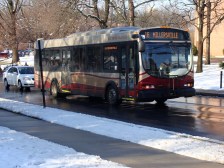DC transit signs $184 million contract for smart payment system

Another major city is preparing for the next generation of public transportation.
Washington, D.C., announced Monday the city has awarded Accenture a $184 million contract to replace the city’s existing fare collection city for its subways, trains and buses, along with public parking.
This news comes in the wake of New York City’s announcement last week that it plans to do away with its card system within the next five years.
Washington’s new system will be designed to provide a state-of-the art system for Metro customers that enables them to continue to use SmarTrip cards, while expanding fare payment to chip-enabled credit cards, federal government ID cards, and mobile phones using near field communications.
Accenture has successfully implemented similar technology in Canada and the Netherlands.
“While Metro pioneered the tap-and-go system we currently use, by today’s standards that system is cumbersome and the technology is not sustainable,” said Metro General Manager and CEO Richard Sarles. “The new technology will provide more flexibility for accounts, better reliability for riders and real choices for customers to use bank-issued payment cards, credit cards, ID cards or mobile phones to pay their Metro fares.”
The system will be built using the Accenture Fare Management Solution, based on commercial off-the-shelf software products. It will use an open architecture that supports a range of payment options and includes the flexibility for future evolution in payment technology.
Later this year, Accenture will provide a pilot program to test the new system in 10 Metrorail stations, aboard 50 branded-route Metrobuses, and in two parking lots. Additionally, 2,000 Metro riders will be selected to participate in the pilot program to test the performance and reliability of the new system.
Similarly, fare vending machines will have large, intuitive, multilingual displays and be fully ADA-compliant. Onboard Metrobus, there will be a new target for customers to tap and MetroAccess customers will be able to validate their trips using the driver’s smartphone and the customer’s ID card.
Metro anticipates lower ongoing maintenance costs as a result of the more modern, component-based technology. Travel transactions and fare calculations will be performed by a central data system that is easier to maintain and manage. In addition, a sophisticated equipment monitoring system to manage maintenance and repair functions will support higher equipment up time for customers.
“We are pleased to be working with an experienced company to bring our customers the same level of technology that we’ve all seen in the airlines and banking industries for payments,” said Metro Deputy General Manager of Administration and Chief Financial Officer Carol Kissal. “Over the next several years, customers will see new stainless steel fare gates with clamshell-like barriers and large, bright, intuitive displays to ease their entries and exits. We believe this new system will enhance the Metro experience for commuters and visitors alike.”
When fully deployed, customers will see approximately 1,000 fare gates, 450 fare vending machines, approximately 1,500 bus payment targets, approximately 160 new payment targets at parking exit lanes, and approximately 600 NEPP-compatible smartphones for MetroAccess operators.
The new system will not accept paper tickets, and Metro will continue the gradual phasing out of paper fare media.
Today, less than one in 10 Metrorail riders pay for their trip with a paper fare card.






